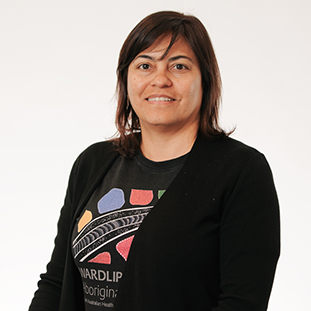
Dr Odette Pearson
ALUMNI AWARD RECIPIENT 2022
Associate Professor Odette Pearson was appointed co-leader Wardliparingga Aboriginal Health Equity theme at the South Australian Health and Medical Institute (SAHMRI) in March this year, leads an independent program of research, and is passionate about building the capacity of the next generation of Aboriginal and Torres Strait Islander researchers. She is co-chair of the Aboriginal Human Research Health Ethics Committee of South Australia and is the first Aboriginal board member of the Adelaide Fringe.
Information correct at the time of receiving the award
Within the Aboriginal and Torres Strait Islander community, type two diabetes is prevalent in the adult population, but it is also concerningly high in older children. Diabetes related conditions include high rates of amputation, eye health issues, circulatory conditions and it’s causing people to die young from heart attacks.
Graduating with a degree in Applied Health Science, eastern Yalanji/Torres Strait Islander Odette Pearson spent seven years living and working in the community of Thursday Island. It was here she first found evidence of the positive impact of primary health care on the incidence of hospitalisations of Aboriginal and Torres Strait Islanders due to type two diabetes.
Odette is proud to have been part of the Torres Strait District Health Service team that developed and implemented an Indigenous led model of primary health care as a result of a health plan defined by the community. “That’s very unique – probably across the globe at the time,” she says. “And it was just amazing to be part of that.”
Successfully applying for a scholarship that was an initiative of the National Health and Medical Research Council (NHMRC) Indigenous Development Grant, Odette was able to successfully transition to research into the influence of primary health care on diabetes outcomes at the newly created SAHMRI, one of the first institutions to recognise Aboriginal health as a stand-alone theme, again led by Aboriginal and Torres Strait Islander people.
With research historically not having a good reputation within the Aboriginal community, it was essential that the Wardliparingga Aboriginal Health Equity theme consult with the community, asking them what their concerns and priorities were to ensure any research they conducted would be beneficial to the community.
“We heard loud and clear that research needed to be done the right way, respectfully and in partnership.” The South Australian Aboriginal Health Accord developed by Odette’s SAHMRI colleagues is a “roadmap” of guiding principles to ensure any research is done in the right way and to the benefit of the community.
Among the nine principles, is the acknowledgement, respect and protection of intellectual and cultural property rights, which all relate to another of Odette’s passions. “Indigenous data sovereignty is a movement – a platform that allows indigenous peoples globally to express their self-determination through data, express their rights and have control over their own information, the story it tells.” Odette’s focus is on the governance of Aboriginal and Torres Strait Islander data, ensuring the community has access to that which may have been denied them in the past. With “Aboriginal data in Aboriginal hands” Odette sees questions grounded in context and experience rather than inquiry which generates meaningful evidence and informed interpretation rather than deficit or blame focused. “This is how data becomes an asset and we receive benefit, even when data has been collected for other purposes in the Western system.”
Odette continues her own research into type two diabetes and leads the Population Health platform while also being involved in research across the theme. Now as co-leader of Wardliparingga, she is also responsible for nurturing the organisational culture and contributing to SAHMRI’s strategic success.
Through her PhD at the University of South Australia, Odette gained skills in relation to research methodologies, analysis and an understanding of the ethics, rigor and integrity of research. She learned how to critique work … and also accept critique of her own. She had access to people who worked with Aboriginal communities but also others who could share their knowledge of health services research, including epidemiology and statistics. At UniSA she found students had plenty of opportunity to be part of the community or industry in which they would eventually establish a career.
Beyond academia, Odette is on the board of Reconciliation SA and is using her position on the board of the Adelaide Fringe to improve access for the Aboriginal and Torres Strait Islander community whether they are artists, venues or simply in the audience. “We have much to contribute across all areas including arts, sports, health, education, and research; when doors open, we walk through them. As a nation we will make important decisions about allowing the First Peoples of this country to have a voice at the table in decisions that impact daily life and future generations.”
Enabling self-determination is at the core of Odette’s research. “Without self-determination, we cannot be in control of, responsible or accountable for our actions. Soon, each of us with one vote will have the opportunity to set the foundations for significant positive change that will create a future that can only benefit all of us.”




